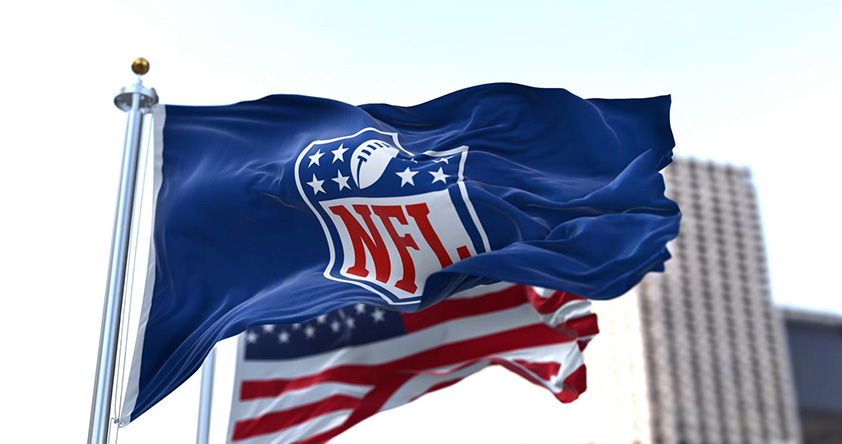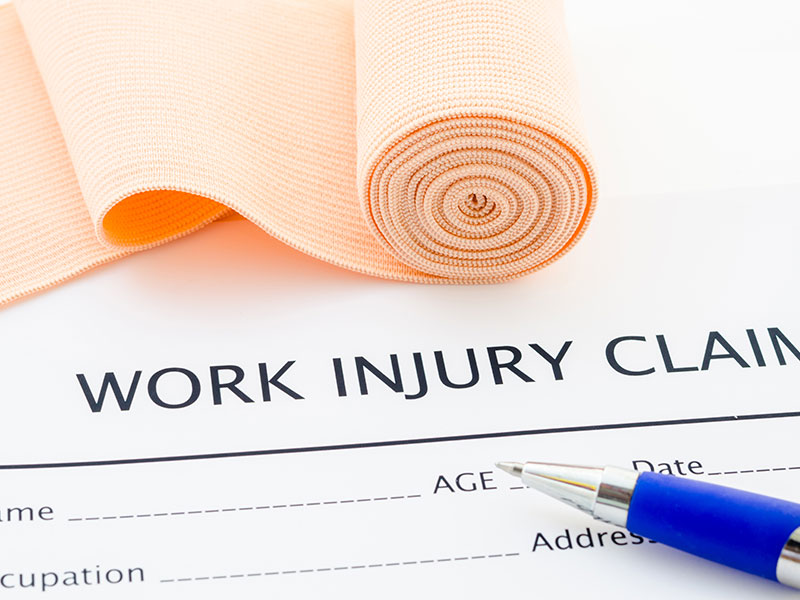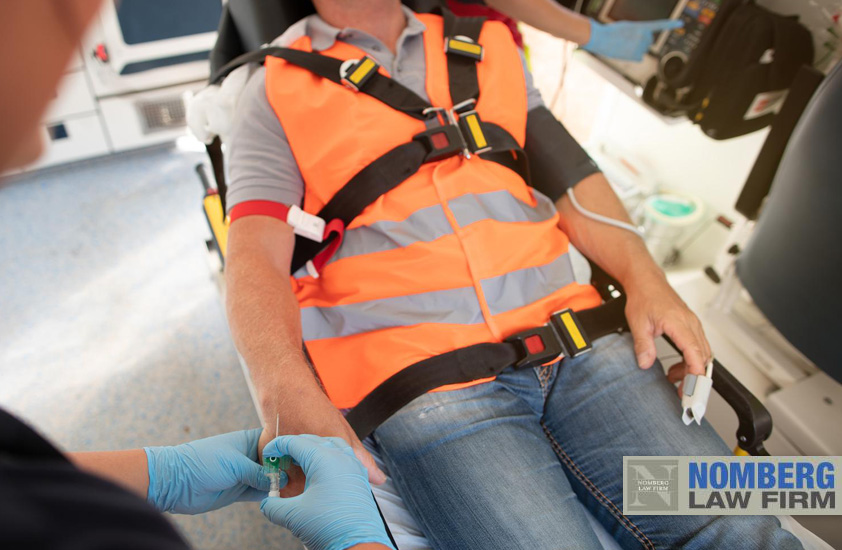The collapse of Buffalo Bills player Damar Hamlin sent shockwaves through the world. Not only did the event happen on live television, but uncertainty around his condition continued for days, leading many to speculate on the nature of football injuries in the NFL and the burdens of responsibility after an injury.
Since then, we’ve heard many questions about his injury:
Does Damar Hamlin’s injury count as a workplace injury since he was technically employed by the NFL when it happened?
Is he entitled to workers’ compensation benefits?
This article will explain the laws around workers’ compensation for Damar Hamlin and other professional athletes.
The National Football League (NFL): A brief background
The National Football League (NFL) is one of the most popular sports leagues in the world. It has a huge impact on American culture and is watched by millions of fans every year. The NFL season runs from September to February, with the Super Bowl being the most-watched event in the United States.
Braving the battle: A look at the physical toll of NFL players struggling with injuries
Players’ injuries are a major concern in the NFL.
Common types of injuries include:
- Concussions
- Torn ligaments
- Broken bones
- Muscle strains and sprains
- Shoulder dislocations
These injuries can have a profound effect on players’ careers, often forcing them to retire early or miss significant amounts of time on the field.
There have been many high-profile cases of NFL players suffering serious injuries throughout the league’s history.
Some notable examples include the following:
- Terrell Owens played 15 seasons in the NFL as a wide receiver for the San Francisco 49ers and the Philadelphia Eagles, resulting in multiple surgeries on his knees, ankles and fingers.
- Peyton Manning is a former Indianapolis Colts and Denver Broncos quarterback. He missed the entire 2011 season after undergoing neck surgery, and he eventually retired due to the lingering effects of the injury.
- Tom Brady has been a quarterback for both the New England Patriots and the Tampa Bay Buccaneers. He has suffered numerous injuries throughout his career, including a torn ACL in 2008 and various hand and knee injuries.
- Adrian Peterson has been a running back for teams including the Washington Redskins, the Detroit Lions, the Tennessee Titans and the Seattle Seahawks and has suffered several serious injuries, including a torn ACL and MCL in 2011 and a broken collarbone in 2016.
- Calvin Johnson played as a wide receiver for the Detroit Lions. He retired in 2016 after suffering from chronic knee and finger injuries.
- Rob Gronkowski played tight end for the New England Patriots and Tampa Bay Buccaneers before being forced to retire in 2019 due to repeated injuries to his back, knees and ankles.
Despite advances in player safety, the NFL has faced criticism for not doing enough to protect players from the physical toll of the sport.
What happened to Damar Hamlin?
On January 2, 2023, Damar Hamlin was playing as a safety for the Buffalo Bills in a game against the Cincinnati Bengals. In the first quarter, he tackled another player, and they both fell to the ground before getting back up. Suddenly, Hamlin fell again, and it became apparent that something was wrong. It was an episode of cardiac arrest.
Within moments, medics rushed to the field and performed both CPR and defibrillation. Hamlin was administered oxygen and given an IV. All the while, fans watched anxiously from the stands and from their televisions at home.
After 10 minutes, Hamlin was taken to a hospital, where he remained in critical condition for some time. Eventually, however, he made enough of a recovery to be discharged and sent back home. He even made a special “Thank You” video to show his gratitude for the public’s support.
What is workers’ compensation?
Many people have questions about Hamlin’s collapse, particularly concerning responsibility.
Was anyone to blame for his heart attack?
Is he entitled to any compensation for his injury?
Workers’ compensation is a form of insurance that’s designed to help people who get sick, injured or disabled while on the job. It can offer a variety of benefits, including:
- Medical expenses
- Lost wages
- Death benefits
Workers’ compensation varies from state to state. In Alabama, workers’ compensation law requires most organizations with more than 5 employees to provide coverage for their workers in the event of an injury.
Workers’ comp is no-fault insurance, which means that employees don’t have to prove that their employer was at fault for their accident to receive compensation. They only need to prove that their injury or illness occurred during the course and scope of their employment.
How workers’ comp differs from personal injury
Learn about the differences between workers’ compensation and personal injury lawsuits to better understand which one might be appropriate for your case.
Can NFL players get workers’ compensation?
Athletic organizations like the NFL are required to have workers’ compensation coverage. However, there can be several hurdles to professional athletes making a claim, including:
- Reason for injury. Generally speaking, your work needs to be the reason for your injury. In the case of Damar Hamlin, if his heart attack was the result of pre-existing health problems, he won’t be eligible for workers’ comp since his heart attack could’ve happened on or off the field. On the other hand, if his cardiac issues can be directly tied to the event that happened on the field, the NFL might be legally liable.
- Type of employment. Not all professional athletes are recognized as “employees.” They can also be considered “independent contractors.” Football players are usually employees, meaning they should be covered under workers’ compensation in most instances.
Are injured NFL players entitled to workers’ compensation benefits?
Work injury attorney Bernard Nomberg discusses if an NFL player injured during a game is eligible for workers’ compensation benefits.
What workers’ comp benefits are available to NFL players?
NFL players are entitled to the same workers’ compensation benefits as any other person who’s been injured on the job. These can include payments for the following:
- Medical expenses. All necessary medical expenses are covered under workers’ comp, including doctor and emergency room visits, rehabilitation, assistive equipment, surgeries, hospital stays and medications.
- Lost wages. Injured workers are entitled to a portion of lost wages (typically two-thirds of their average weekly wages) while they’re unable to work or can only work in a reduced capacity while they recover from their injuries.
- Death benefits. These are paid to certain dependents in the event that an employee dies after their work-related injury or illness.
What steps should you take to get benefits after a work injury in Alabama?
There are 5 important steps to filing a workers’ compensation claim in Alabama:
1. Seek medical attention. Always seek medical attention as soon as possible after an injury. When you do, ask for copies of the medical records that document your workplace injury. These will be necessary to show that your injury or illness resulted from your work so you can get compensation.
Also, with the exception of an emergency, make sure that you go to an approved physician. In Alabama, your workplace is allowed to send you to a medical provider within their own insurance network, and treatment from an “unauthorized healthcare provider” might not be repaid.
2. Notify your employer within 5 days. There are a few exceptions for this, including if you were wounded severely enough that you couldn’t have been reasonably expected to contact your workplace about your injury. Otherwise, however, you’ll need to give notice within 5 days, or your claim will likely be denied.
3. Follow up with your employer. After you report your injury to your employer, they’re required to file a First Report of Injury Form. If your employer refuses to file this form, you can file it yourself, but we highly recommend contacting an attorney for help.
4. Wait for the results of your claim. The insurance company will then perform an investigation. If your claim is denied, you can appeal it by filing a lawsuit with the Alabama district court.
5. Contact an attorney. If you need help with your claim, your claim is denied, or you’re unsure if the insurance company is offering you a fair settlement amount, reach out to a workers’ comp attorney who can ensure your rights are protected.
Tips for managing a workplace medical emergency
A workplace medical emergency is a situation where an employee experiences a sudden and serious health issue.
Heart attacks are a common type of workplace medical emergency, and they can have severe consequences if not promptly addressed.
In the event of a heart attack, it’s important for employees and employers to be prepared to respond quickly and effectively. This may involve calling 911 and providing CPR if necessary.
It’s also essential to make sure that the affected employee receives appropriate medical treatment as soon as possible.
Employers can take steps to prepare for a workplace medical emergency by implementing emergency response plans, providing CPR training for employees, and ensuring that appropriate medical equipment and supplies are readily available.
They can also encourage employees to be proactive about their health by promoting healthy lifestyle habits and encouraging regular check-ups with a doctor.
Overall, it is essential for employers and employees to be prepared for a workplace medical emergency and to work together to ensure the health and safety of everyone in the workplace.
Contact an Alabama workers’ compensation attorney
You don’t have to collapse on live television to receive workers’ compensation benefits. If you’ve been hurt, sick or disabled while on the job, you have the right to file a claim for workers’ comp benefits. Working with an experienced workers’ compensation attorney can help you navigate the legal complexities of your situation and maximize your potential benefits for the future.
What to do & not do when filing an Alabama workers’ comp claim
If you have been injured on the job, the first thing on your to-do list is to report your injury followed by have your injury treated. The last thing on that list, and probably not even a thought to be put on your list at all, is ensuring you avoid the common pitfalls a fair percentage of workers’ compensation claims fall prey to.
If you’ve suffered an injury or illness at work in Alabama, contact the experienced workers’ compensation attorneys at Nomberg Law Firm. We can negotiate with your employer and their insurance company on your behalf so you can focus on recovering from your injury. Contact us today, and let us devise an individualized plan for you.




